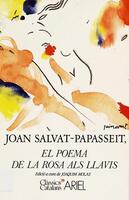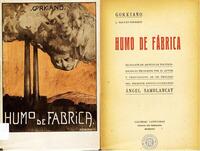Salvat-Papasseit, Joan, 1894-1924
(Updated 08/10/2024)
Joan Salvat-Papasseit (Barcelona, 1894-1924). A poet with both avant-garde and traditional influences, author of political and social articles and manifestos. From humble beginnings, he was self-taught and a great defender of the working class. Inspired by political anarchism, he published his first pieces between 1914 and 1916 in revolutionary publications such as Justicia Social and Sabadell federal, under the pseudonym Gorkiano. In 1917, he founded the magazine, Un enemic del poble, under the subtitle, fulla de subversió espiritual; in 1918, the avant-garde magazine, Arc-voltaic; and in 1921, the post avant-garde magazine, Proa, where nationalist texts mixed with poetry.
In 1918, he published his first book, Humo de fábrica, a collection of political articles with a prologue by Àngel Samblancat. Finally, he swayed towards poetry and, influenced by avant-garde trends, in 1919 he published Poemes en ondes hertzianes . In his second collection of poems, L’irradiador del port, i les gavines (1921), he introduced popular forms from the Romantic era. In 1922, Les conspiracions and La gesta dels estels appeared and one year later El poema de la rosa als llavis, including compositions around the theme of love, was published. Having suffered tuberculosis and after various stays in hospital, he died in 1924. The anguish he felt as he was dying is reflected in his posthumous work, Óssa menor, published in 1925.
During the twenties and thirties, the musician and composer Eduard Toldrà was the first to set some of his poems to music. The figure of the poet became popular, especially from the sixties onwards, after decades of little fame, thanks to the musical compositions and recitations by authors of the Nova Cançó, among others.
The Biblioteca de Catalunya holds the poet´s correspondence and family documentation from his brother, Miquel.

